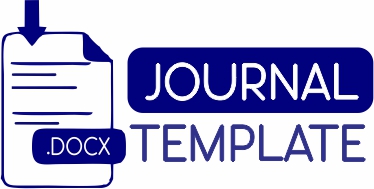Analisis Perkembangan Ekonomi di Era Revolusi Indrustri 4.0 Dan 5.0 dalam Merekonstruksi Kepribadian Islam Untuk Mengurangi Krisis Moral (Lost Of Adab)
Abstract
Discussing the importance of morals or etiquette in the era of the industrial revolution 4.0 and 5.0 is an interesting issue to follow. The interesting thing is that the increasingly sophisticated technological advances are not necessarily able to maintain the moral personality of mankind, as evidenced by the start of the development of the industrial world, it has not guaranteed a good human civilization and morals, and is also strengthened by the emergence of various kinds of news of crime, violence, sexual deviations, and so on. rampant where a person can not speak well and easily do bad things that make a loss of adab today brings such a bad impact for future generations. So we need a solution idea to answer this problem. This study has the following objectives: 1) to determine economic progress in the post-pandemic era of the industrial revolution 4.0 and 5.0; 2) to find out the benefits of economic and technological development to ensure a civilized and moral human being. This research is qualitative, using data and literature review which is strengthened by analysis from various sources who experience economic problems. The collected data was then analyzed by descriptive analysis method. By analyzing post-pandemic economic developments and the entry of the technological development revolution era towards 5.0, it will form an identity for every Muslim to re-maintain their Shibghoh as a religious community. In fact, with this research, the author finds that with the development of the economy and the industrial revolution, it is also obligatory to develop morals and etiquette of a religious community, because the position of adab and morals will not be replaced by the position of progress today. The author hopes that the current economic development and industrial revolution can maintain the sibghoh adab and morals of mankind.
Keywords
References
Bekraf. (2017). Apa itu Ekonomi Kreatif. Retrieved from Indonesia Kreatif: http://indonesiakreatif.bekraf.go.id/ikpro/programs/apa-itu-ekonomi-kreatif/.
Bekraf. (2018). Profil Usaha/Perusahaan 16 Subsektor Ekonomi Kreatif Berdasarkan Sensus Ekonomi 2016. Badan Pusat Statistik (BPS).
Grunebaum,Von (1953) Medieval Islam a Study in Cultural Orientation (London: The University of Chicago Press).
Haris, (2010) Etika Hamka Konstruksi Etik Berbasis Rasional Religius, (Yogyakarta: LKIS Yogyakarta).
Kountur, Ronny (2009), Metode Penelitian Untuk Penulisan Skripsi dan Tesis (Jakarta: Buana Printing).
Nada, Syekh Abdul Aziz bin Fathi as-Sayyid (2016) Kedudukan Adab dan Sejarah Penulisnya, (Jakarta: Pustaka Imam Syafi’i)
Nazir, Moh. (2014) Metode Penelitian (Bogor: Penerbit Ghalia Indonesia,).
Rahardjo, (Mudjia 2014) “Analisis Muatan Sebagai Metode Pengukuran”, in Metode Penelitian Kualitatif Analisis Isi dan Analisis Data Sekunder, ed. by Nanang Martono (Jakarta: PT Raja Grafindo Persada,).
Ramadhani, R. A., & Muqowim, M. (2021). Rekontruksi Pemikiran Kh Hasyim Asy’ari Tentang Adab Murid Terhadap Guru Dalam Menghadapi Revolusi Industri 4.0. Jurnal Tawadhu, 5(1), 1-11.
Risdianto, E. (2019). Analisis pendidikan indonesia di era revolusi industri 4.0. April, 0–16. Diakses pada, 22.
Riyadi, Ahmad Ali (2007) Dekontruksi Tradisi: Kaum Muda NU Merobek Tradisi.
Rofaida, R., Aryanti, A. N., & Perdana, Y. (2019). Strategi Inovasi pada Industri Kreatif Digital: Upaya Memperoleh Keunggulan Bersaing pada Era Revolusi Industri 4.0. Jurnal Manajemen Dan Keuangan, 8(3), 402-414.
Rosyadi, S. (2018), Revolusi Industri 4.0: Peluang dan Tantangan bagi Alumni Universitas Terbuka.
Saleh, F. A., Muqowim, M., & Radjasa, R. (2020). Adab Siswa Terhadap Guru Menurut Pandangan Sayyid Muhammad Naquib Al-‘Atthas Dalam Menjawab Tantangan Revolusi Industri 4.0. Jurnal Tawadhu, 4(2), 1085-1113.
Sugiyono, (2014) Cara Mudah Manyusun Skripsi, Tesis dan Disertasi.
Suwito, (2004) Filsafat Pendidikan Akhlak, (Yogyakarta: Belukar).
Tanaya, I. (2018, April 18), Revolusi Industri 4.0, Ancaman atau Berkah? . Retrieved fromKompasiana:https://www.kompasiana.com/www.inatanaya.com/5ad6f349ab12ae1f2d68f1b2/revolusi- industri-4-0-ancaman-atau-berkah?page=all.
Tarantang, J., Awwaliyah, A., Astuti, M., & Munawaroh, M. (2019). Perkembangan sistem pembayaran digital pada era revolusi industri 4.0 di indonesia. Jurnal al-qardh, 4(1), 60-75.
Widiastuti, Retno (2010) Kebaikan Akhlak dan Budi Pekerti, (Semarang: ALPRIN).
W. Munawwir, (1997) Kamus al-Munawwir Arab-Indonesia Terlengkap, (Surabaya: Pustaka Progressif).
Zarkasyi, Hamid Fahmy. (2005), “Worldview Sebagai Asas Epistemologi Islam”, Islamia, Majalah Pemikiran dan Peradaban Islam, Thn II No.5 April-Juni.
DOI: 10.55824/tamb.v1i3.182
Refbacks
- There are currently no refbacks.
Copyright (c) 2022 The Academy Of Management and Business

This work is licensed under a Creative Commons Attribution 4.0 International License.






5.png)

